
One day, a pair of twins, as they were playing together in accordance with the nature of children, went together under a palm tree. By the evil contrivance of fate, just then a large palm-fruit fell from the tree on the boy’s head like a stroke of lightning on a castor bean plant. Struck on the head in the manner of the crow-and-palm tree fable, the boy died then by the first accidental death. Because he had very slight passions, the boy-twin went to heaven. Cotton indeed rises in the air from its lightness. Formerly, large birds at once lifted up the bodies of dead twins like nest wood, and threw them in the Ocean. At that time, from the deterioration (of the times), the body remained just so. For the avasarpini has decreasing power. Then the second one of the twins, the girl, by nature endowed with innocence, stood with tremulous eyes, like a remnant after a sale. Her parents took her and raised her, and gave her the name Sunanda. After a few days her parents also died. For the twins live but a short time after their children are born. The girl, dazed by wondering what to do, with restless eye, wandered alone in the forest like a deer lost from the herd. Continue reading “The Lord’s Marriage” »
The Lord’s Marriage
Shree Siddhagiriraj Yatra Five Chaityavandans
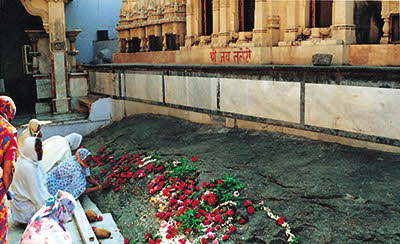
1. First Chaityavandan of Jay Taleti
Shree Shatrunjaya siddhakshetra, dithe durgati vare;
Bhav dhari ne je chadhhe, Tene bhav par utare. 1
Anata siddhano ahe thham, Sakal tirthno ray;
Pruva navanu Rushabhdev,
Jyain thhavia prabhupay. 2
Surajkund sohamano kavadjaksha abhiram;
Nabhiraya kul mandano, Jinvar karun pranam. 3
Continue reading “Shree Siddhagiriraj Yatra Five Chaityavandans” »
Description of Vaitadhya
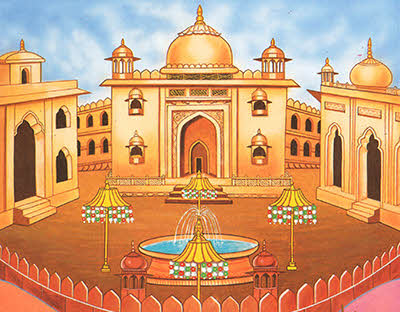
Taking their families and all their retinue and ascending the best of cars, they went to Vaitadhya. They landed on Mt. Vaitadhya which is kissed by the mass of waves of the Lavana Ocean at its borders, placed like a measuring-rod between the east and west quarters; a boundary between the northern and southern parts of Bharata, fifty yojanas wide north and south; buried six and a quarter yojanas in the earth, twenty-five yojanas high; embraced on all sides by the Gangas and Sindhu rivers as if by Mt. Hima with arms stretched out from afar; possessing caves named Khandaprapata and Tamisra that were like houses of pleasure and rest of the Sris of the two halves of Bharata; Continue reading “Description of Vaitadhya” »
Attainment of Disgust with Existence
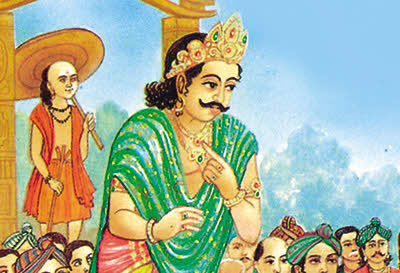
While the citizens were playing there in this way, the Master thought, “Is there such sport anywhere else?” Then by clairvoyant knowledge the Master knew the very highest pleasure of heaven and that pleasure of Anuttara-heaven formerly enjoyed by himself. His bonds of delusion dropping away, again he reflected thus: “Alas! these people, overcome by sense-objects, do not know their own good. Ah! in this well of samsara, jivas from their karma perform actions that are nothing more than coming and going like a jar on a water-wheel. Alas! alas! for creatures whose minds are blinded by delusion this birth always passes in vain like the night for those asleep. Continue reading “Attainment of Disgust with Existence” »
Eleventh Incarnation as Vajranabha – Part 2
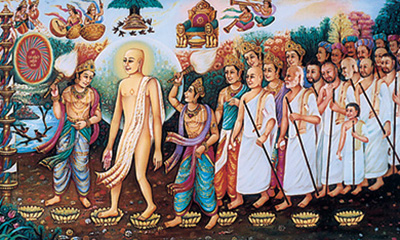
Vajranabha, like a brother of Dharma, surrounded by munis, brothers in the vow, wandered over the earth. Bahu and the other brothers and the charioteer had their lord in the Master Vajranabha, like the five senses subject to the mind. By the power of their yoga all the magic powers, phlegm, etc., became apparent like mountain herbs by moonlight. The body of a leper, if rubbed with just a particle of their phlegm, became golden like a heap of copper from kotivedha juice. Continue reading “Eleventh Incarnation as Vajranabha – Part 2” »
Description of a Samavasarana
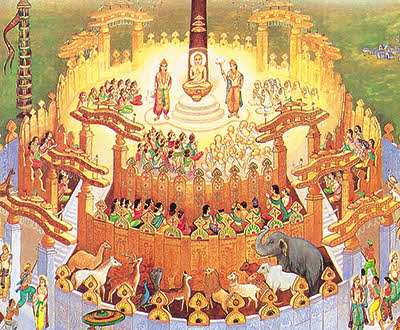
Then the Vayukumaras themselves, purged of pride, cleaned the surface of the earth for one yojana. The Meghakumaras sprinkled the earth with fragrant water; by fragrant vapors it made incense worship, as it were, to the Lord who was to come. The Vyantaras covered the surface of the earth with shining mosaics of gold and jewels like themselves with devotion. Continue reading “Description of a Samavasarana” »
Continuation of Lord Rishabhdev’s life as a Sadhu
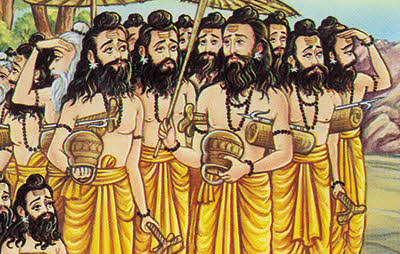
Kaccha, Mahakaccha, and the other royal ascetics, dwelling in the forest on the right bank of the Gangas like deer; wearing barkgarments like living trees; not touching householders’ food like something that had been vomited; their bodies very thin like empty skins, the elements dried up by fasts of two, three, or more days; even on the day for breaking fast eating dried leaves, dried fruit, etc., continued to think in their hearts only of the Blessed One, and did not go to another. The Blessed One, after wandering in silence among the Aryas and non-Aryas for a year without food, reflected as follows: “Just as lamps exist on oil, as trees on water, so on food alone the bodies of living creatures exist. Continue reading “Continuation of Lord Rishabhdev’s life as a Sadhu” »
Establishment of Customs

Twenty lacs of Purvas after his birth, the Lord became king in this city to guard the subjects. The first king of kings, like the omkara of mantras, he guarded his subjects like his own children. The Lord appointed ministers, like the minor members of his own body, able in the punishment of the wicked and protection of the good. The King, Vrsabha-marked, established able police for guarding against theft, etc., like Sutraman Lokapalas. For the government he, the elephant of kings, collected elephants, the superior branch of the army like the best member of the body. He, Vrsabha-bannered, maintained fine horses holding their necks very high, as if in rivalry with the horses of the sun. The son of Nabhi himself built chariots made of close-fitted wood like aerial cars on earth. Then the son of Nabhi made a collection of foot-soldiers of well-tried courage, just as in a cakravartin incarnation. The son of Nabhi established in it army-commanders like very strong pillars of the palace of new sovereignty. The Lord of the World collected oxen, camels, buffaloes, mules, skilled in their use. Continue reading “Establishment of Customs” »
The Lord’s Kevala
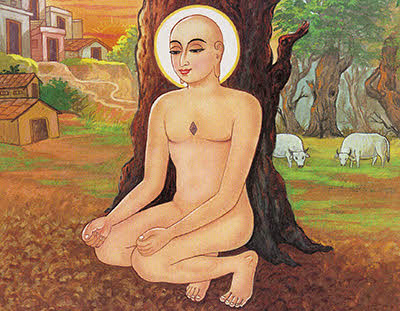
Independent, unstumbling like the wind, practicing various and manifold penances, persevering in manifold vows, the Blessed One wandered for a thousand years as easily as a day in Mleccha countries Yavana, Domba, etc., observing silence, making non- Aryas well-disposed to others just from the sight of him, untouched by disturbances, enduring trials. The Blessed One, Vrsabhabannered, went to Purimatala, the chief suburb of the great city Ayodhya. Continue reading “The Lord’s Kevala” »
Coronation as King
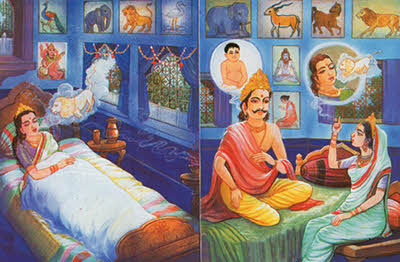
The Master, even though indifferent, enjoyed pleasures with his wives for a long time; for good-feeling karma cannot be destroyed otherwise. When a little less than six Purvas had passed after the wedding, while the Lord enjoyed himself with them, the jivas of Bahu and Pitha fell from Sarvarthasiddhi and entered Sumangala’s womb as twins. Likewise the jivas of Subahu and Mahapitha fell from Sarvarthasiddhi and entered Sunanda’s womb. Then Lady Sumangala, like Marudeva, saw fourteen great dreams, indicating the importance of the embryo. The Mistress related the dreams to the Master, who said unhesitatingly, “Your son will be a Cakravartis.” Continue reading “Coronation as King” »









